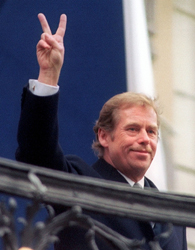Václav Havel was a revolutionary, a poet, a playwright and a president. Although he was reluctant to become a public figure, he has been one of the most influential people in Czech history.
Václav Havel’s Early Days
Born October 5, 1936, in Prague, Czechoslovakia, the course of Václav Havel’s entire life was seemingly shaped before he turned four years old. For generations, Havel’s family had been among the country’s wealthy, intellectual elite. His grandfather built the famous Lucerna Ballroom while his uncle founded one of the first Czech film studios. Long a believer in parliamentary democracy, Havel’s father was an outspoken critic of Nazi Germany and believed in nurturing cultural pursuits through capitalism.
Although Havel was born into a free state, on March 14, 1939, the president, Emil Hacha, surrendered control to Adolf Hitler, who then divided the country into several states. At the end of World War II, the country fell under communist rule and the leadership sought to punish the country’s old bourgeois families.
When Havel finished his primary schooling the government prohibited him from continuing formal study. He took a day job as a chemical laboratory assistant but studied economics in the evening at Czech Technical University. Because of the political climate, he was prohibited from studying liberal arts, which was his preference.
Sources in this Story
- The Official Web site of Václav Havel
- New York Times: Excerpt from Václav Havel A Political Tragedy in Six Acts By JOHN KEANE
- Artful Dodge: A Conversation with Václav Havel
- Radio Prague: Václav Havel
- BBC News: Art mirrors life in new Havel play
- New York Times: Vaclav Havel, Former Czech President, Dies at 75
Havel’s Notable Accomplishments
Although he began to write poetry in 1956 when he was 20, it was not until after he had served his two required years in the Czech military that Havel’s writing career truly began. He found work in a Prague playhouse and became fascinated with the absurdist plays of Samuel Beckett and his contemporaries.
In 1963, his first play, “The Garden Party,” was performed, and in 1965, his most famous work, “The Memorandum,” hit the stage. At this time, the communists had begun to relax their hold on the country’s arts scene and Havel’s themes—which included poking fun at bureaucracy and mindless obedience—did not invite censor by the government.
Three years later was the Prague Spring, a period that began when leadership of the country was given to Alexander Dubcek, a man dedicated to listening to the will of the people and expanding freedoms. Just eight months later the USSR invaded Czechoslovakia, and the firm, conservative hand of Communism was established once again.
The new government banned Havel from any form of artistic pursuit and for several years he worked at a brewery, writing plays that would only be performed outside his home country. In the mid-1970s, Havel actively began to lobby the government for human rights. He was jailed for four years for vocally opposing the government and for speaking in favor of civil liberties.
On November 17, 1989, a wave of students took to the streets, in part to commemorate the death of Jan Palach, who had set himself on fire 10 days earlier to protest the Soviet occupation, but ultimately to demand democratic reforms. The six-week period that followed became known as the Velvet Revolution, and Havel’s was one of the loudest voices among those calling for change.
When the dust settled, a new government was put in place and Havel was at its head. Although in the past he had said he didn’t aspire to a career in politics, Havel was the leader of Czechoslovakia’s new era. He was reelected in 1990, but during the breakup of the Czech Republic and Slovakia in 1992 he resigned in protest of the split. Once the government reassembled as the Czech Republic in 1993, he ran for election again and won.
Václav Havel and His Work
- “To the Castle and Back”
- “The Garden Party and Other Plays”
- “Temptation”
- “Disturbing the Peace: A Conversation with Karel Huizdala”
- “Open Letters: Selected Writings 1965-1990”
During the 13 years of his presidency, Havel’s strong desire for human rights and his unwillingness to compromise led to many clashes with his prime minister. He was a chief supporter of the 1999 decision of the Republic to join NATO. In February 2003, he retired from the presidency, only to be replaced by one of his chief political rivals.
The Rest of the Story
Havel’s wife of 32 years, Olga, passed away in 1996, the same year Havel was diagnosed with lung cancer. Less than a year later he married his mistress, the Czech actress Dagmar Vekrnová. Havel kept active after retiring from politics, although he suffered complications from the lung cancer. On December 18, 2011, he died at his country home. The New York Times reported at the time that he had suffered severe respiratory problems for months before his death.
“To the Castle and Back,” Havel’s autobiography about his time as president was published in 2007, and later that same year his first play since before he was president, “Leaving,” was published. It premiered at the Archa Theater in Prague on May 22, 2008 to rave reviews.
This article was originally written by Jennifer Ferris; it was updated October 11, 2017.











